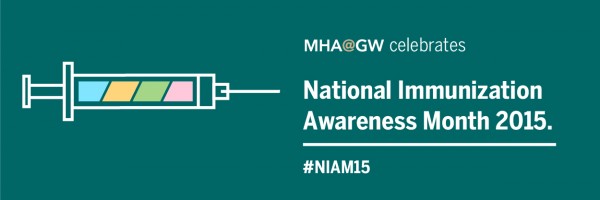Adult Vaccination: Protect Yourself, Protect Others

In the interest of promoting more robust discourse around the importance of regular vaccinations for serious but preventable contagious conditions, MHA@GW is hosting a guest post series in honor of National Immunization Awareness Month (NIAM). Throughout the month of August, we’re featuring pieces from thought leaders and advocates in the field who were asked to write about the importance of immunization in 2015. Read more about the project in our introduction post.
By Ashley Huntsberry-Lett, AgingCare.com

For many people, the topic of vaccinations evokes childhood memories of anxious trips to the doctor for shots. However, keeping up with recommended vaccine schedules through adulthood and old age is just as imperative as receiving those initial doses in childhood.
As we age, our immune systems begin to function less efficiently. Healing and immune responses slow significantly because the body produces fewer immune cells and antibodies. This increases the likelihood of older individuals falling ill. According to the Census Bureau’s 2014 National Population Projections report, the projected number of Americans 65 and older will be 82.3 million by 2040. With the elderly population surging as baby boomers age, the health implications are a point of substantial concern for the entire country.
Proper nutrition, regular exercise, adequate sleep and a positive mental state can all help keep an individual’s immune system in top condition. However, an all-around healthy lifestyle is not the only way to reduce the age-related risk of getting sick. Vaccinations play an important role in keeping each and every part of the population healthy — especially those with susceptible immune systems.
Members of AgingCare.com’s Caregiver Forum are constantly searching for ways to keep their aging loved ones healthy, and simple disease prevention can have a huge impact on an older individual’s quality of life and longevity. Preventive measures such as vaccination help people avoid the pain and discomfort of being sick, and they cost a mere fraction of the price of treating the illness itself. These health care costs can include doctor’s visits, medications, tests and even hospitalization or nursing home placement, and become overwhelmingly expensive very quickly.
Each person who follows through with all recommended vaccines not only experiences the benefits personally, but also contributes to the herd immunity of those around them. Although vaccines are not 100 percent effective for everyone, it is this widespread compliance that reduces the risk of infection for those who are unable to be vaccinated such as young children, individuals who are allergic to components of certain vaccines, and people with compromised immune function due to things such as cancer treatments, HIV/AIDS or Guillain-Barré syndrome.
Common vaccinations administered to seniors are shingles (herpes zoster), annual flu (influenza) shots, and pneumonia (pneumococcal). Each vaccine has specific guidelines and recommendations for eligible recipients and procedures for administration, but the Centers for Disease Control and Prevention (CDC) recommends that older individuals receive these vaccines since they are at increased risk of contracting these diseases and potentially succumbing to them.
A study published in the Journal of the American Medical Association (JAMA) in 2013 showed that use of the flu vaccine was associated with a lower risk of major adverse cardiovascular events in the year following vaccination. The human body responds to the flu virus with a great deal of inflammation that can result in a heart attack, stroke or heart failure for individuals who already have cardiovascular problems. This is a serious connection because approximately 83.6 million adults in the U.S. have one or more types of cardiovascular disease (CVD), and about 66 percent of CVD deaths occur in people ages 75 and older. This is only one example of how inoculation can protect against a specific disease as well as a whole host of related health complications.
In a similar vein, a senior who contracts the flu can quickly develop full-blown pneumonia. According to the CDC, influenza and pneumonia weigh in as the eighth-most common cause of death, having claimed the lives of 56,979 people in 2013. However, aging individuals aren’t the only ones that need to be vaccinated. A yearly injection or nasal spray for each member of your family will help keep everyone healthier and will significantly reduce the likelihood that your aging loved one will contract a potentially life-threatening illness. Not to mention, most family caregivers can’t afford to fall ill since they are directly responsible for someone else’s day-to-day care.
In addition to family members receiving all necessary vaccinations, it is of utmost importance that health care workers and professional caregivers to stay up-to-date with their immunizations. The CDC strongly recommends that long-term care workers receive annual flu vaccines. As a caregiver or a health worker, it is part of your duty to inoculate yourself in order to prevent the transmission of preventable diseases from patient to patient. This is especially important in institutional environments such as hospitals, nursing homes, assisted living facilities and the like.
Compared to younger portions of society, there are some differences in the vaccination schedule and dosing for older individuals. Since seniors’ immune function tends to be reduced, doctors might recommend follow-up doses and vaccines containing a greater number of antigens. When it comes to paying for vaccines, most health insurance plans cover the cost of these preventive measures. Medicare beneficiaries (those 65 and older who meet eligibility guidelines) can receive partial or full coverage for influenza, pneumococcal and hepatitis B vaccinations, and prescription drug plans (Part D) provide more comprehensive coverage.
Immunization is a powerful tool that helps protect the most vulnerable members of society from contagious illnesses. Limiting the impact of vaccine-preventable diseases on older generations prevents long-term illness and unnecessary or premature placement in institutions such as nursing homes. Vaccines also reduce the risk of complications and even death. This simple collaborative effort can have widespread benefits for the health of millions of people.
Ashley Huntsberry-Lett is the editor-in-chief for Aging Care, a site devoted to providing quality information and support for family caregivers who are looking after aging loved ones. She graduated from the University of Florida with a B.A. in English, and is currently working towards her Master of Arts in mass communication with a specialization in journalism at UF’s College of Journalism and Communications.


